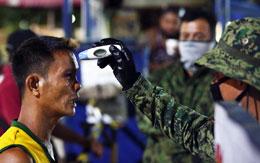Virus boosts rule of the iron fist in Asia

Human rights concerns are escalating across Asia, as the region’s authoritarian-leaning rulers tighten their grip over nations with emergency powers, curfews and censorship.
As several countries implement border controls and impose forms of lockdowns, Human Rights groups said they are increasingly concerned that governments may use excessive force, militarization, or other abuses of power in implementing anti-pandemic measures.
The Asian Forum for Human Rights and Development, together with 35 civil-society organizations, said it is gravely concerned over the lack of a human-rights focus in the current response to the ongoing Covid-19 pandemic by the member states of the Association of Southeast Asian Nations.
We call upon ASEAN member states to emplace human rights and dignity as the core principles in addressing the pandemic, it said.
Filipino lawmakers this week granted President Rodrigo Duterte emergency powers today to contain the viral spread by his legislative allies who dominate the national Congress.
The new emergency measures will give the president additional powers to, among other things, realign public funds, direct the operation of private hospitals and directly oversee Metro-Manila’s soldier-backed lockdown operations which have so far proved porous.
Amid fears of abuse by the authoritarian-leaning leader, with some critics warning he may use his new powers to impose nationwide martial law, the bill emphasized that the president should “exercise powers necessary and proper” to implement the lockdown only “for a limited period and subject to restrictions.”
The final version, approved by both Senate and the House of Representatives, watered down the original language, including provisions that would have allowed for the “takeover of public utilities and private businesses.”
Duterte’s supporters claim that special powers are necessary to streamline ongoing efforts to assist emergency public health measures, enforce strict social distancing, sustain a month-long lockdown of Metro-Manila and prevent disruption to the national economy.
Since rising to power in 2016, the tough-talking Duterte has repeatedly signaled his desire to impose national martial law to establish greater law and order and address the country’s myriad challenges.
The epidemic threat, his critics fear, may have finally given the president the special powers he clearly craves.
In Thailand, prime minister Prayut Chan-o-cha has announced a state of emergency starting this Thursday to curb the spread of the coronavirus.
The state of emergency will include a combination of legal force and "requests for cooperation," he said in a televised address.
"Whether places would remain open or closed will be part of the next phase of measures that we will come up with," Prayut said. "It depends on how well people cooperate."
Once enacted, the decree gives the prime minister the authority to restrict people's movements unless they are given exceptions by authorities. It would bar people from holding gatherings while some roads, buildings, or areas will be declared restricted zones.
In India, police are shutting down campaigns and rallies in New Delhi, considered the epicentre of the agitation against Prime Minister Narendra Modi’s new citizenship law that fast-tracks Indian nationality for persecuted religious communities from three neighbouring countries but excludes Muslims.
Delhi police officers cited the ban on public gatherings under the current lockdown as the reason for breaking up a protest this at south Delhi's Shaheen Bagh park that has continued for over 100 days and inspired similar demonstrations across the country.
Over 70 people have been killed in countrywide protests triggered by the Citizenship Amendment Act 2019, which critics say the act undermines India's secular constitution and is an attempt by the Hindu nationalist Bharatiya Janata Party government to marginalize Muslims.
Human Rights Watch is reporting that the Hun Sen-led government in Cambodia is arresting people for expressing concerns about COVID-19’s impact, claiming they are spreading “fake news”.
“The Cambodian government is misusing the COVID-19 outbreak to lock up opposition activists and others expressing concern about the virus and the government’s response,” said Phil Robertson, deputy Asia director for Human Rights Watch. “The government should stop abusing people’s free speech rights and instead focus on providing the public with accurate and timely information about COVID-19.”
In the name of protecting health, China has gone much further, said rights groups concerned about arbitrary detention, crackdown on freedom of speech and lack of access to information.
A facial recognition system that identifies masked people has been developed, apparently with 90 percent accuracy, and apps that decide whether a person poses a contagion risk and should be allowed into malls, subways and other public spaces have extended the government's already extensive system of surveillance and tracking.
A recent report by the Toronto-based cyber-research group Citizen Lab found that Chinese messenger app WeChat and the video streaming app YY blocked keyword combinations that included criticism of President Xi Jinping and policies related to the virus, part of the tightening of media control under Xi.
Myanmar and Singapore are also actively using repressive measures such as anti-fake-news laws to conduct misinformation, although this ultimately failed to quell public fear or doubt. This high-handed approach risks public health and welfare, particularly for those with limited access to information and education. It mutes people’s legitimate expressions of doubt and queries on the actual situation in their country and inspires more speculation and misinformation on the Covid-19 situation in-country, said a report.
In Jakarta, news reports said the government of Indonesia has deployed its National Intelligence Agency to help monitor the situation, instead of relying on medical experts. Without an independent body to conduct monitoring and coordination of and among governmental bodies, potential violations and abuses of human rights, including the right to access to health care, right to freedom of movement, right to personal security, right to privacy, and right to non-penalization for lack of documentation, is high, said Cornelius Hanung a human-rights activist from Indonesia.









